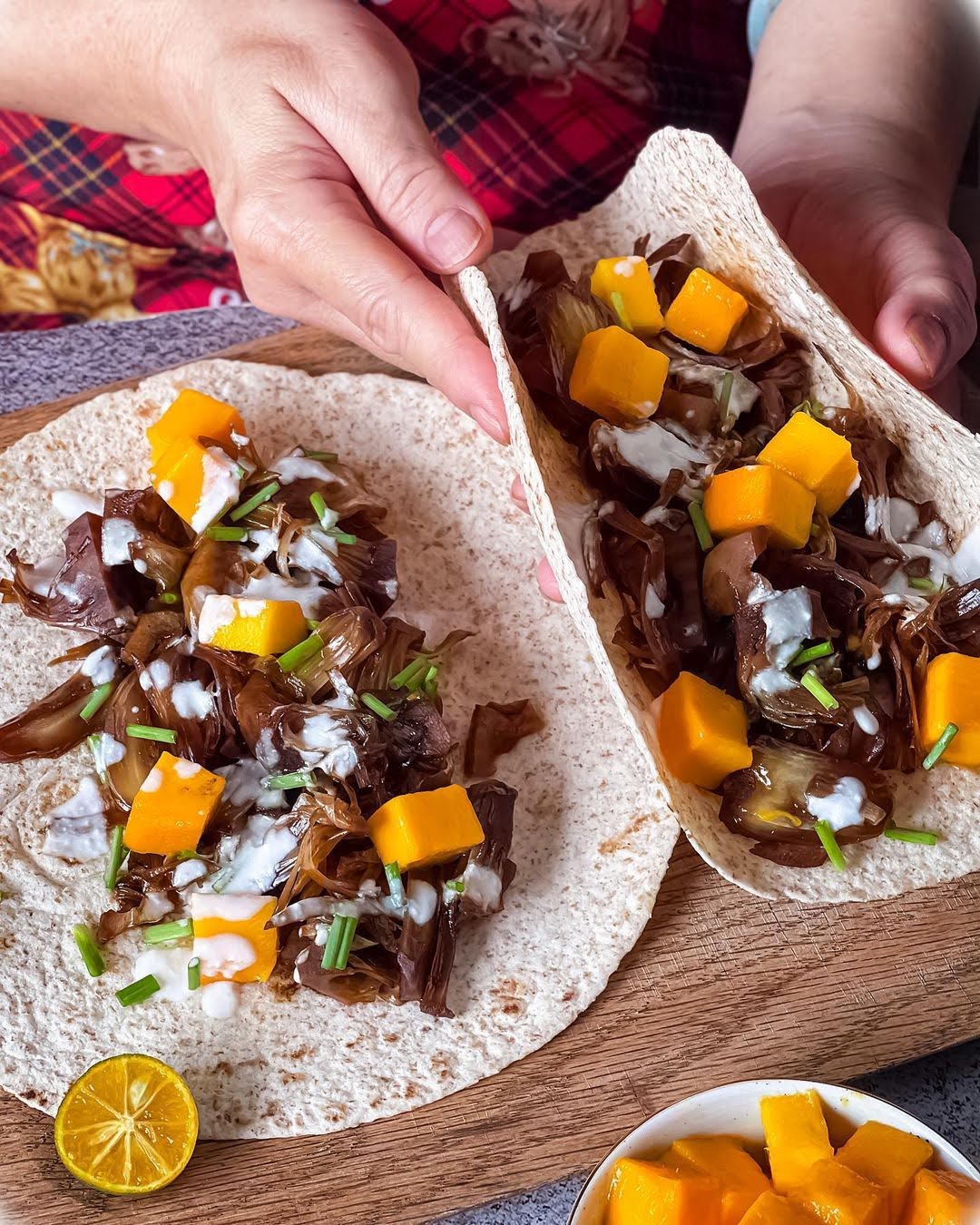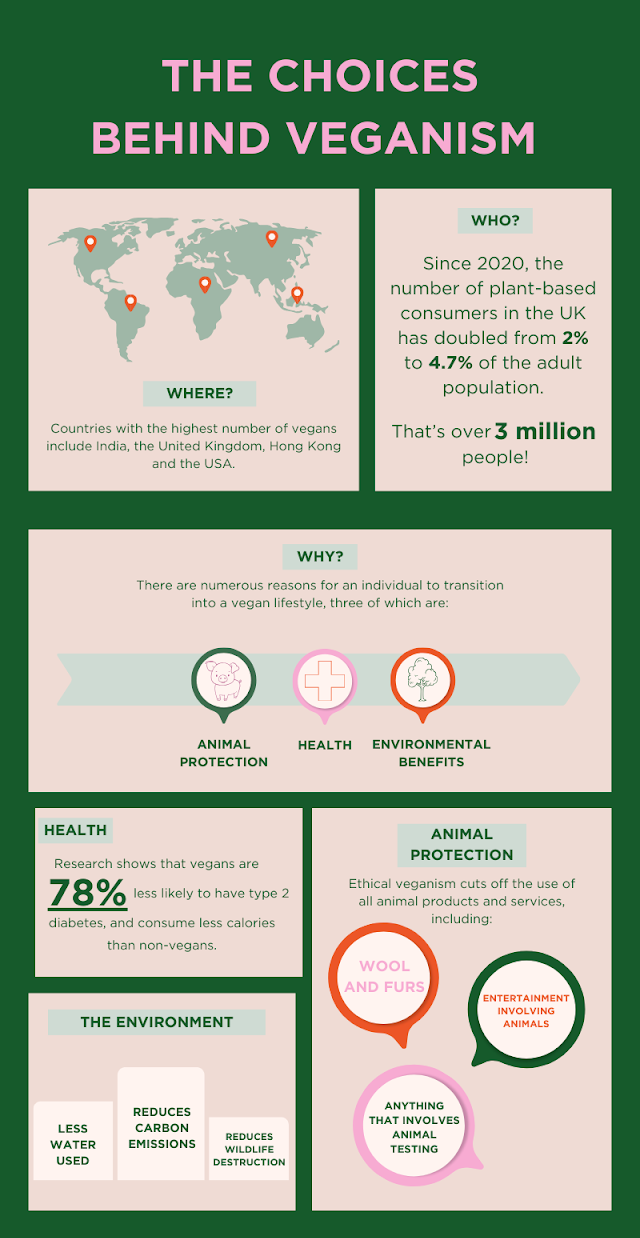Beyond Meat: The Ethos of Veganism
Join ADRIENNE TAN in exploring the reasons behind the vegan lifestyle and the challenges of going entirely animal-free.
BY
Adrienne Tan
The UrbanWire Social Media Manager
Hype Issue #59
Published on
August 2, 2024
Eggs are definitely an animal product. That’s what I mused out loud when I came across a video on a popular vegan influencer’s TikTok page, where she was showcasing a vegan poached egg at a Christmas dinner.
Undoubtedly, I was confused. My personal recollections with regards to vegan or even vegetarian food mostly include the economical bee hoon and mixed vegetable rice stalls near my home. Upon further perusal of social media sites and restaurant menus in Singapore, my horizons have been broadened. From vegan stingray to seafood-less sushi, one thing was clear in my mind: veganism is a force to be reckoned with. But it also led me to my next train of thought: Why do people choose to become vegan?
The Healthy Foodie
Enter Emily, a dietician and content creator who goes by @fruityemz on Instagram. Boasting over 49 thousand followers on Instagram, she creates popular and delectable recipes on social media – which are entirely vegan.

Emily has created her social media presence through her vegan recipes. Photo courtesy of: Emily.
Experimenting with food developed her passion for nutrition, healthy living, and cooking. Although we often say that old habits die hard, especially as cutting off animal food products after at least a decade of consuming them is usually a difficult task, Emily opted to go vegan at 15 years old for health reasons — overnight and cold turkey.
While she told The Centre for a Responsible Future that it posed difficulty at first (as she used to dislike vegetables), she persevered and has no regrets to date.
As of 2023, an estimated 5% of Singapore’s population are either vegetarian or vegan. That is over 290,000 people. This number, as well as the demand for animal-free products, is only projected to increase not just locally, but all over the world as people become more health-conscious and aware of how their diets affect the environment.
Misconceptions about Veganism
One of the most common misconceptions about veganism surrounds nutrition deficiency. It can be common for people to think that veganism compromises the intake of nutrients like calcium and protein, or that a meatless diet is not filling enough. Research reports also show that eliminating animal foods can create Omega-3 and iron deficits.
On the other hand, Emily explains that essential nutrients, including healthy fats, carbohydrates, and proteins, can still be found in various sources such as avocado, nut butter, and tofu. With good meal planning, the job of hitting the sufficient nutrient intake is achievable.

Vegan teriyaki jackfruit, one of Emily’s recipes. Photo taken from @fruityemz on Instagram.
Apart from concerns about nutrition deficiency, there is also the perception that vegan dining options are limited as many restaurants do not provide vegan options. However, there has been a reported rise of vegan companies in recent years. One example is Impossible Foods, a company specialising in plant-based meat which now sells their products in over 700 places in Singapore, just about tripling the number since 2020. This also puts to rest another myth about veganism: that a plant-based diet is simply “green” – full of vegetables with little variety.
However, Emily is not a big fan of the plant-based meat initiative. For her, it is still not as healthy as a whole foods-based vegan diet, as it is ultimately still processed food. Ironically, research shows that because it is plant-based, more processing and ingredients like sodium are needed for it to imitate actual meat.
Upon browsing through Emily’s numerous recipes, it was truly eye-opening to see all the diverse and nutritious meals that could be created – all without a single animal product. From cinnamon buns to even jjajangmyeon, many of her creations appear to be just as convincing (and as delicious) as the originals. Whether you are a fan of plant-based meat or not, it seems that there is something for everyone.

Vegan Ferrero Rocher crepes, another of Emily’s recipes. Photo taken from @fruityemz on Instagram.
So…why do people choose to become vegan?
There are multiple reasons for an individual to transition into a plant-based lifestyle. For some, health can be a major factor in the drastic change. Medical News Today explains that as a vegan diet is generally low in saturated fat and higher in fibre, it lowers blood sugar levels, improves kidney health, and reduces the risk of diseases due to high antioxidant levels. This makes it a recommended diet for diabetics and patients with heart issues.
According to Healthline, veganism is also considered a “lifestyle strongly anchored in animal rights”. This applies more to individuals who go the extra step and become ethical vegans.
But what is the difference between ethical and “regular” veganism? The difference is that ethical veganism is not only about watching what we eat. It also involves cutting off the use of animal products in most, if not all aspects of our lives, including clothing, daily-use items, and anything that is created with the help of animal testing. Additionally, ethical vegans avoid activities that use animals for entertainment, such as racing or circuses.

A breakdown on vegans worldwide and the factors that encourage them to turn vegan. Infographic by Adrienne Tan.
Transitioning into an animal-free lifestyle is never easy, especially as it is tough to trace everything we use back to its source, which could limit what vegans can consume and which businesses they patronise. But, as more individuals and corporations innovate with ingredients and methods, vegans can look forward to bigger and better gastronomical opportunities – taking what Emily does for example.
Despite all the recent developments in the vegan industry, there is still a large majority of people who do not follow the same dietary habits. However, Emily emphasises the need to be a little less rigid when that happens, and explains that it is unhealthy to only be surrounded by people with the same views, while not taking in the opinions of others who do not.
So, to answer the question of why people choose to go vegan: there is no set answer. It really depends on the unique reasons and circumstances each individual faces, weighed against the challenges, and the major transition they may face.
At the end of the day, no matter what reason we change our consumption habits for, it is important to be mindful of our decision, as we are ultimately what we eat.

Fantastic site A lot of helpful info here Im sending it to some buddies ans additionally sharing in delicious And naturally thanks on your sweat
I share your level of appreciation for the work you’ve produced. The sketch you’ve displayed is elegant, and the content you’ve authored is sophisticated. Yet, you appear to be concerned about the possibility of heading in a direction that could be seen as dubious. I agree that you’ll be able to resolve this matter efficiently.
What a superb work! Both the analysis and the presentation of the facts are quite impressive. It’s obvious that you’re very knowledgeable about the topic. This is a post that I will return to at a later date. Your expertise is much appreciated.
Fantastic site Lots of helpful information here I am sending it to some friends ans additionally sharing in delicious And of course thanks for your effort
Mobil bahis Olumsuz: Siteye erişim bazen zor olabiliyor, bu da bahis yaparken sıkıntı yaratabiliyor. https://www.sutesisatcisikenan.com/umraniye-tikaniklik-acma/
Your blog is a beacon of light in the often murky waters of online content. Your thoughtful analysis and insightful commentary never fail to leave a lasting impression. Keep up the amazing work!
of course like your website but you have to check the spelling on several of your posts A number of them are rife with spelling issues and I in finding it very troublesome to inform the reality on the other hand I will certainly come back again
Bahis oynama Olumsuz: Promosyonlar genellikle sadece yeni kullanıcılar için geçerli, mevcut kullanıcılar için sınırlı. http://www.umraniyetuvalettikanikligiacma.ipektesisat.com/index.html
Bahis uygulamaları Olumsuz: Siteye erişim bazen zor olabiliyor, bu da bahis yaparken sıkıntı yaratabiliyor. https://www.sultantesisat.com/hizmet-Umraniye-tikaniklik-acma-36.html
Sanal bahis incelemeleri Olumsuz: Ödemelerde bazen gecikmeler yaşanabiliyor, bu da can sıkıcı. http://www.umraniyetuvalettikanikligiacma.ipektesisat.com/index.html
Great piece! Anyone with even a passing interest in the subject should read your in-depth analysis and explanations. Your inclusion of examples and practical ideas is really appreciated. We appreciate you being so kind with your time and expertise.
I found this post to be very informative and well-organized. Your detailed analysis and clear explanations make it a pleasure to read. The practical examples you included were particularly helpful. Thank you for sharing your knowledge with us.
Obrigado, estou procurando informações sobre esse tópico há algum tempo e a sua é a melhor que descobri até agora. Mas e em relação aos resultados financeiros? Você tem certeza sobre o fornecimento
Your blog is a testament to your dedication to your craft. Your commitment to excellence is evident in every aspect of your writing. Thank you for being such a positive influence in the online community.
My brother recommended this blog to me, and he was absolutely correct. This post truly brightened my day. You wouldn’t believe the amount of time I had dedicated to finding this information. Thank you!
helloI really like your writing so a lot share we keep up a correspondence extra approximately your post on AOL I need an expert in this house to unravel my problem May be that is you Taking a look ahead to see you
Alguém essencialmente deu uma mão para fazer artigos significativos. Id state Essa é a primeira vez que visitei a página do seu site e até agora fiquei surpreso com a pesquisa que você fez para tornar este envio real incrível Tarefa maravilhosa
Ive read several just right stuff here Certainly price bookmarking for revisiting I wonder how a lot effort you place to create this kind of great informative website
Your blog is a constant source of inspiration for me. Your passion for your subject matter is palpable, and it’s clear that you pour your heart and soul into every post. Keep up the incredible work!
Have a question or an issue? No problem. The Flash Upload support team is available 24/7. You can contact them anytime at contact@flashupload.cloud. They’re here to assist you and answer all your questions.
Meu primo me sugeriu este site. Não tenho certeza se este post foi escrito por ele, pois ninguém mais sabe tão detalhadamente sobre meu problema. Você é incrível, obrigado
startup talky Good post! We will be linking to this particularly great post on our site. Keep up the great writing
Its like you read my mind You appear to know so much about this like you wrote the book in it or something I think that you can do with a few pics to drive the message home a little bit but instead of that this is excellent blog A fantastic read Ill certainly be back
Real Estate I am truly thankful to the owner of this web site who has shared this fantastic piece of writing at at this place.
BaddieHub I like the efforts you have put in this, regards for all the great content.
BaddieHub very informative articles or reviews at this time.
It was a pleasure reading this interesting and thorough article. Even while discussing more advanced subjects, your writing style remains plain and simple. This is a great post that I will be using again and again because of how much I learnt from it. You are doing an excellent job.
Your blog is a treasure trove of knowledge! I’m constantly amazed by the depth of your insights and the clarity of your writing. Keep up the phenomenal work!
Your blog is a true hidden gem on the internet. Your thoughtful analysis and engaging writing style set you apart from the crowd. Keep up the excellent work!
Tech to Trick Nice post. I learn something totally new and challenging on websites
Tech to Trick I just like the helpful information you provide in your articles
allegheny county real estate Nice post. I learn something totally new and challenging on websites
Techarp very informative articles or reviews at this time.
you are in reality a good webmaster The website loading velocity is amazing It sort of feels that youre doing any distinctive trick Also The contents are masterwork you have done a fantastic job in this topic
Simply wish to say your article is as amazing The clearness in your post is just nice and i could assume youre an expert on this subject Well with your permission let me to grab your feed to keep updated with forthcoming post Thanks a million and please carry on the gratifying work
helloI really like your writing so a lot share we keep up a correspondence extra approximately your post on AOL I need an expert in this house to unravel my problem May be that is you Taking a look ahead to see you
I do trust all the ideas youve presented in your post They are really convincing and will definitely work Nonetheless the posts are too short for newbies May just you please lengthen them a bit from next time Thank you for the post
أنابيب HDPE الكوروجيت في العراق يفخر مصنع إيليت بايب في العراق بتقديم أنابيب HDPE الكوروجيت عالية الجودة، التي تشتهر بمتانتها ومرونتها. تم تصميم هذه الأنابيب لتحمل الظروف البيئية القاسية، مما يجعلها مثالية لمجموعة واسعة من التطبيقات، بما في ذلك الصرف الصحي، وأنظمة الصرف، والاستخدام الصناعي. تضمن تقنيات التصنيع المتقدمة المستخدمة في مصنع إيليت بايب أن أنابيب HDPE لدينا تفي بأعلى معايير الصناعة، وتوفر أداءً طويلاً وموثوقية. كواحدة من أفضل وأهم المصانع في العراق، تلتزم شركة إيليت بايب بتقديم منتجات فائقة الجودة تلبي احتياجات عملائنا. لمزيد من المعلومات حول أنابيب HDPE الكوروجيت، تفضل بزيارة موقعنا elitepipeiraq.com.
I just could not leave your web site before suggesting that I really enjoyed the standard information a person supply to your visitors Is gonna be again steadily in order to check up on new posts
Excellent blog here Also your website loads up very fast What web host are you using Can I get your affiliate link to your host I wish my web site loaded up as quickly as yours lol
This article is incredibly well-researched,
SocialMediaGirls I do not even understand how I ended up here, but I assumed this publish used to be great
Mating Press There is definately a lot to find out about this subject. I like all the points you made
GlobalBllog I very delighted to find this internet site on bing, just what I was searching for as well saved to fav
Blue Techker I very delighted to find this internet site on bing, just what I was searching for as well saved to fav
Blue Techker Nice post. I learn something totally new and challenging on websites
Thinker Pedia very informative articles or reviews at this time.
Mangaclash I very delighted to find this internet site on bing, just what I was searching for as well saved to fav
Blue Techker This was beautiful Admin. Thank you for your reflections.
Rely on BWER Company for superior weighbridge solutions in Iraq, offering advanced designs, unmatched precision, and tailored services for diverse industrial applications.
Vegan dining is booming, with options like Impossible Foods expanding everywhere. Whether you love plant-based meats or stick to whole foods, there’s always something delicious! https://culvarsmenu.com/culvers-gluten-free-menu/
Vegan options are on the rise with brands like Impossible Foods. Whether plant-based or whole foods, there’s something delicious Menu for everyone.
Vegan options are booming with Impossible Foods making waves! Whether you’re plant-based or not, there’s a bite for everyone. https://portillomenu.com
Discover endless drink possibilities at Sonic with recipes from sonicmenuspot.com/category/drinks-recipes. From fruity blends to creative soda combinations, this section covers how to make fan-favorite Sonic drinks at home. Great for DIY lovers and fans who want to recreate the magic anytime.
Discover unbeatable value during Applebee’s happy hour times with half-price appetizers and drink specials. Whether you’re catching up with friends or on a date, Applebee’s creates the perfect setting. Knowing Applebee’s happy hour times ensures you never miss out on their delicious deals and relaxed atmosphere.